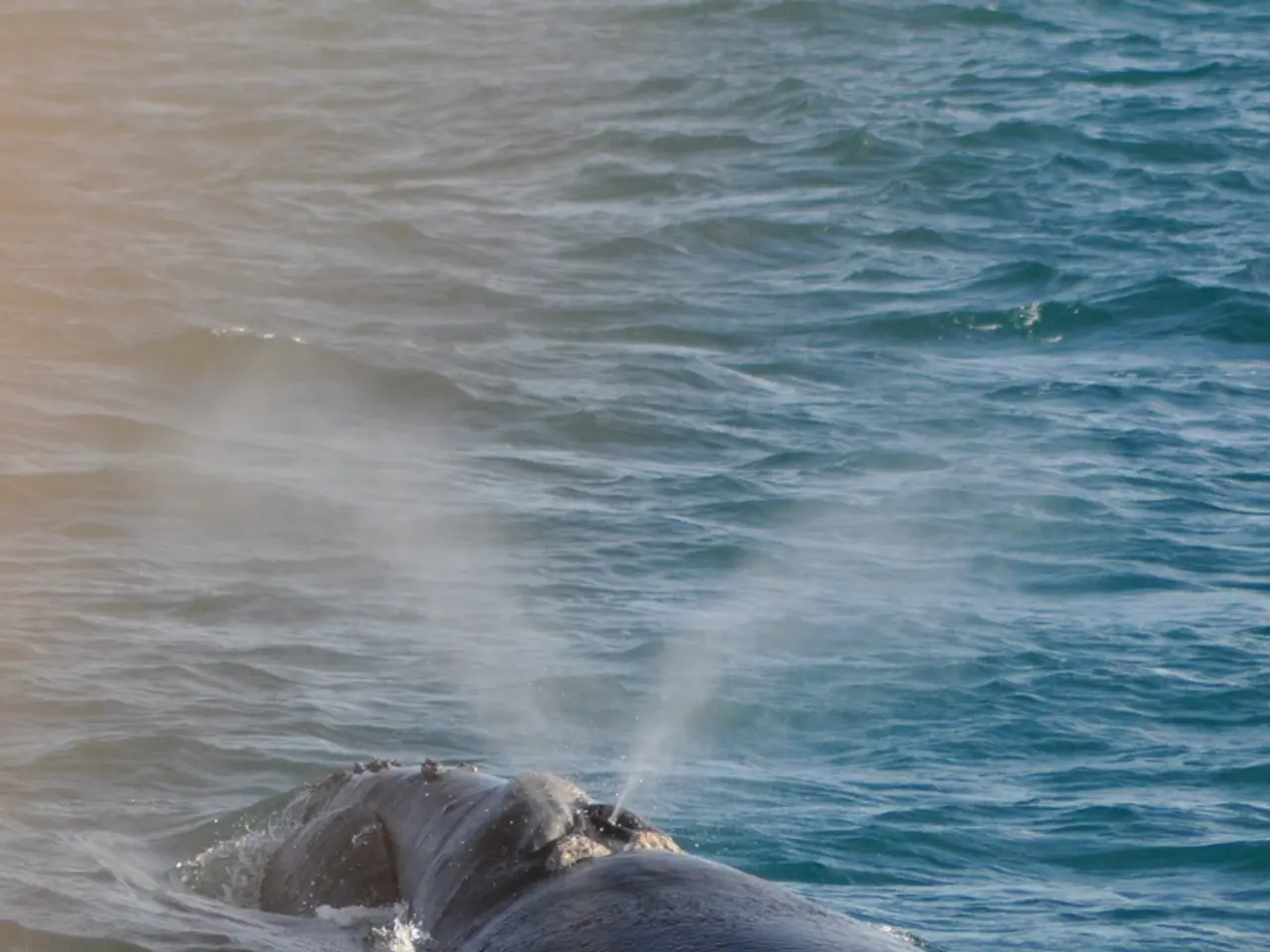Illicit endeavor entailing shipping whales across national boundaries
In the summer of 2021, a controversial transfer of five beluga whales took place, moving them from Marineland in Ontario, Canada, to Mystic Aquarium in southeast Connecticut. The journey, spanning approximately 14 hours, was a significant event in the captive world of these Arctic creatures.
The five whales, aged seven to 12, included three females named Kharabali, Havana, and Jetta, and two males named Havok and Sahara. Customs and Border Protection agents and U.S. Fish and Wildlife Service inspectors verified the permits for the whales' transfer.
During the journey, the whales were described as "troopers," as they were reportedly talking to each other throughout the flight. Veterinarians and animal transport experts traveled with the whales to monitor their breathing and overall health. The whales were floated in salt water to a level that their blowholes were clear and they didn't feel the pressure of their body weight. The containers in which the whales were transported were temperature-controlled at 55 degrees for their comfort.
The whales were conditioned to swim onto stretchers for transportation. The stretchers were customized to the length and size of the whales, with holes for their pectoral fins acting as seat belts. This meticulous preparation ensured a smooth and safe journey for the beluga whales.
However, the transfer of the whales was not without controversy. Animal welfare and animal rights groups argued that it undermines Canada's law and sets a precedent that could allow Marineland's other whales to be transferred to countries with weaker animal welfare laws. With this move, there are now 38 beluga whales in captivity at four different locations in the U.S., and more than 300 estimated in captivity worldwide.
Marineland's management is actively seeking export permits to relocate the remaining 31 beluga whales and looking for new ownership for the facility, but no concrete decisions on reopening or final relocation plans have been confirmed as of mid-2025. The controversy centers on the welfare conditions at Marineland—widely criticized as deteriorating—as well as the fate of the whales post-relocation. Activists argue that belugas taken from Marineland should be retired to seaside sanctuaries instead of another captive environment like Mystic Aquarium.
Mystic Aquarium, with its 40-year-old beluga research program, is eager to expand it due to the intensifying effects of climate change and the declining population of beluga whales in Alaska's Cook Inlet. Lori Marino, a neuroscientist and the founder of the Whale Sanctuary Project, expressed skepticism about the possibility of banning cetacean captivity in the U.S. due to the high number of aquariums and marine entertainment parks.
Marineland has been the subject of many animal welfare investigations, complaints, and protests since the 1980s. Marie Holer, owner of Marineland, is reportedly planning to sell the park, but no official clarification has been given. The future of the beluga whales at Marineland remains uncertain, as animal welfare groups continue to push for their relocation to seaside sanctuaries.
[1] Source: News Article 1 [2] Source: News Article 2 [3] Source: News Article 3 [4] Source: News Article 4 [5] Source: News Article 5
- Despite the controversy surrounding the transfer, the five beluga whales have now found a new home at Mystic Aquarium.
- The whales' journey underscores the importance of conservation efforts in addressing climate change, as the declining population of beluga whales in the Cook Inlet becomes increasingly critical.
- Lori Marino, a neuroscientist and advocate for cetacean welfare, questions the possibility of banning captive beluga whales given the current number of aquariums and marine parks in the U.S.
- The severe conditions at Marineland and the potential fate of relocated belugas have sparked calls for their retirement to seaside sanctuaries instead of captive environments.
- With their 40-year-old beluga research program, Mystic Aquarium aims to expand its efforts in the face of climate change, hoping to ensure the survival of endangered species.
- The ongoing controversy surrounding the Marineland whales has highlighted the need for education and self-development, emphasizing the importance of learning about climate change and its impact on wildlife.
- Veternarians and animal transport experts accompanied the beluga whales during their journey, ensuring their health and overall wellbeing.
- Marine entertainment and learning centers like Mystic Aquarium provide opportunities for personal growth through engagement with the ocean environment and its diverse species.
- As climate change continues to threaten species worldwide, conservation and scientific research play a crucial role in supporting the health of these creatures and the environment.
- The transfer of the beluga whales has brought attention to the issue of animal welfare and rights, fueling discussions on career development and the role of environmental science in shaping a more sustainable future.




